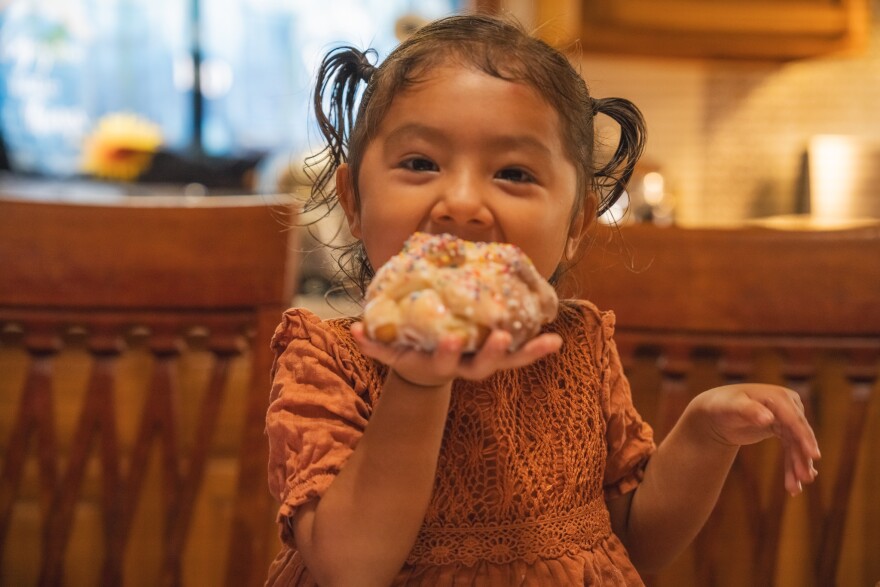Ana Karen Robles’ four kids grew up singing traditional Día de Los Muertos tunes. Luna, who is two years old, especially enjoys one that cheers a skeleton getting out of its grave. They sing along while Robles bakes pan de muerto, a traditional snack in Mexico people enjoy in November to celebrate the Day of the Dead.
Sugar and sprinkles cover her dinner table, but it's usually like that at this time of the year. Robles has a small bakery at home where she prepares cakes, bread and other sweet treats, but these days she is very busy dipping round sweet breads in sugar and glaze called pan de muerto, a type of glazed or sugar-topped bread Mexicans eat to remember their loved ones.
Para leer esta historia español, haz clic aquí.
Among people in her community in Nashua, she is best known as “la muchacha del pan de muertos” meaning the to-go woman when it comes to these snacks. Some people have told her she has blessed hands.
“People tell me such nice things,” she says. She has a pile of fresh oranges in the kitchen to grate. “It is the combination of the orange peel and the anise that makes this bread good,” she says.

Robles comes from a small and remote town in Mexico called Santa Maria de los Baños with a population of 2,000. She says it is usual for men to emigrate temporarily to work in the U.S, working for a few months and then going back. Her husband was one of them, but after a few trips he ended up staying in Nashua and bringing her family with him.
The Robles have made a living for themselves. He works in construction, and a few years ago they bought a house in Nashua. Their driveway is pristine, beautifully made with different types of stone. “My husband made it,” she says proudly. They live in a neighborhood where many other families from the same town as theirs have settled down.
“We consider ourselves family because we don’t have more people closer,” she said. “When we have a party I am always the one who brings the desserts.”

Robles said her at-home bakery is a way of remaining close to her children, as it is very important for her to be their support at any moment. But she also enjoys being someone in her community.
“I can’t not work, I have always been like that,” she says.
Robles brings her pan de muerto to every celebration people from Santa Maria de los Baños have in Nashua. Many times she offers them for free.
She says people from her town are very thoughtful when it comes to helping others. They have a system called tandas in which multiple families pitch $200 each week and when someone needs money to pay an urgent debt or even buy a car when they just arrived in the U.S and desperately need a car to work.
The money is also used as a “savings account” where the person gets the money back at the end of each round. She says the amount can go up to $7,000. The Robles used the money once to bring their kids to Disney World. They hope to do it again.
As for the secret recipe for pan de muertos some say she has, Robles says she learned everything on Youtube but has done many experiments in her kitchen to find her own, and that is what makes her successful. “Sometimes I can’t keep up,” she says laughing. It’s not easy to be the woman who people count on every Dia de los Muertos, she says.
“[But] everyone cheers for me!” she says, like the skeletons Luna loves so much.


